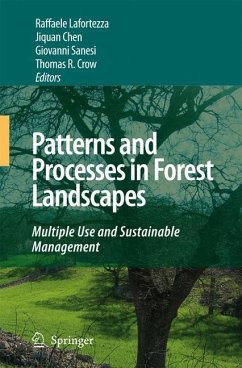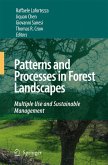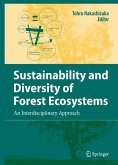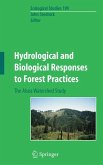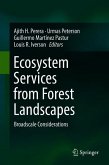Increasing evidence suggests that the composition and spatial configuration - the pattern - of forest landscapes affect many ecological processes, including the movement and persistence of particular species, the susceptibility and spread of disturbances such as fires or pest outbreaks, and the redistribution of matter and nutrients. Understanding these issues is key to the successful management of complex, multifunctional forest landscapes, and landscape ecology, based on a foundation of island bio-geography and meta-population dynamic theories, provides the rationale to deal with this pattern-to-process interaction at different spatial and temporal scales.
This carefully edited volume represents a stimulating addition to the international literature on landscape ecology and resource management. It provides key insights into some of the applicable landscape ecological theories that underlie forest management, with a specific focus on how forest management can benefit from landscape ecology, and how landscape ecology can be advanced by tackling challenging problems in forest (landscape) management. It also presents a series of case studies from Europe, Asia, North America, Africa and Australia exploring the issues of disturbance, diversity, management, and scale, and with a specific focus on how human intervention affects forest landscapes and, in turn, how landscapes influence humans and their culture.
An important reference for advanced students and researchers in landscape ecology, conservation biology, forest ecology, natural resource management and ecology across multiple scales, the book will also appeal to researchers and practitioners in reserve design, ecological restoration, forest management, landscape planning and landscape architecture.
This carefully edited volume represents a stimulating addition to the international literature on landscape ecology and resource management. It provides key insights into some of the applicable landscape ecological theories that underlie forest management, with a specific focus on how forest management can benefit from landscape ecology, and how landscape ecology can be advanced by tackling challenging problems in forest (landscape) management. It also presents a series of case studies from Europe, Asia, North America, Africa and Australia exploring the issues of disturbance, diversity, management, and scale, and with a specific focus on how human intervention affects forest landscapes and, in turn, how landscapes influence humans and their culture.
An important reference for advanced students and researchers in landscape ecology, conservation biology, forest ecology, natural resource management and ecology across multiple scales, the book will also appeal to researchers and practitioners in reserve design, ecological restoration, forest management, landscape planning and landscape architecture.
From the reviews:
"The book aims to elucidate the dynamics of forest ecosystems in the broad sense ... . The four-part work provides some of the most salient, pertinent examples of landscape ecological research. Scholars, students, and forest managers seeking a current synthesis within these divisions of landscape ecology may consult one of the parts independently--each part contains several well-referenced chapters--or the book as a whole. ... Summing Up: Highly recommended. Upper-division undergraduate through professional collections." (D. L. Richter, Choice, Vol. 46 (11), 2009)
"This highly accessible book provides a comprehensive overview of recent research and theory about the Landscape Ecology state in Forest. ... this book based on the main results of the 2006 IUFRO Landscape Ecology Workshop of Locorotondo (Bari, Italy) is the most recent comprehensive textbook on this subject for students, researchers and professionals from around the world. ... To conclude, this is the most thoughtfull, scientific and case studies ... that I have read on ecology processes and management in Forest Landscapes." (Marc Benoît, Annals of Forest Science, Issue 1, 2010)
"I was therefore pleasantly surprised to find in this volume a rich and relatively coherent collection of papers whose authors include many of the world's leaders in the field of landscape ecology. ... the editors span the extremes of the range of approaches to forest landscapes and this is one of the strengths of the book. ... The book is very well edited and produced and will be a valuable reference work for anyone concerned with large scale patterns and processes in forest landscapes." (Jeffrey Sayer, International Forestry Review, Vol. 11 (1), 2009)
"The book aims to elucidate the dynamics of forest ecosystems in the broad sense ... . The four-part work provides some of the most salient, pertinent examples of landscape ecological research. Scholars, students, and forest managers seeking a current synthesis within these divisions of landscape ecology may consult one of the parts independently--each part contains several well-referenced chapters--or the book as a whole. ... Summing Up: Highly recommended. Upper-division undergraduate through professional collections." (D. L. Richter, Choice, Vol. 46 (11), 2009)
"This highly accessible book provides a comprehensive overview of recent research and theory about the Landscape Ecology state in Forest. ... this book based on the main results of the 2006 IUFRO Landscape Ecology Workshop of Locorotondo (Bari, Italy) is the most recent comprehensive textbook on this subject for students, researchers and professionals from around the world. ... To conclude, this is the most thoughtfull, scientific and case studies ... that I have read on ecology processes and management in Forest Landscapes." (Marc Benoît, Annals of Forest Science, Issue 1, 2010)
"I was therefore pleasantly surprised to find in this volume a rich and relatively coherent collection of papers whose authors include many of the world's leaders in the field of landscape ecology. ... the editors span the extremes of the range of approaches to forest landscapes and this is one of the strengths of the book. ... The book is very well edited and produced and will be a valuable reference work for anyone concerned with large scale patterns and processes in forest landscapes." (Jeffrey Sayer, International Forestry Review, Vol. 11 (1), 2009)

